In today’s digital age, the term AI—short for Artificial Intelligence—has become more than just a buzzword. It has evolved into a transformative force, redefining how we live, work, and interact with the world. From voice assistants to smart homes, from personalized recommendations to automated medical diagnostics, AI is weaving itself into the fabric of modern society. But what exactly is AI, and how is it shaping our future?
Understanding AI
At its core, AI refers to the simulation of human intelligence in machines that are programmed to think and learn. These machines can perform tasks that typically require human intelligence, such as understanding natural language, recognizing images, solving problems, and making decisions.

There are two main types of AI: narrow AI and general AI. Narrow AI is designed to perform specific tasks, such as facial recognition or driving a car. It is the type of AI we encounter most often today. General AI, on the other hand, would possess the ability to perform any intellectual task that a human can do. While general AI remains a long-term goal, narrow AI is already revolutionizing industries.
AI in Daily Life
The presence of AI in our daily lives is more profound than many realize. Every time you ask Siri a question, receive a movie recommendation from Netflix, or use Google Maps to avoid traffic, you are interacting with AI. These systems analyze massive amounts of data to deliver relevant, personalized responses.
Smart home devices use AI to learn your preferences and routines. For instance, a smart thermostat can adjust the temperature based on your daily habits, helping to save energy and reduce costs. Virtual assistants like Alexa and Google Assistant rely on AI to understand voice commands and perform actions such as setting reminders, playing music, or controlling smart devices.
AI in Business
Businesses across the globe are leveraging AI to streamline operations and enhance customer experiences. In retail, AI is used to manage inventory, forecast demand, and provide personalized shopping experiences. Chatbots powered by AI handle customer service inquiries around the clock, reducing the need for human intervention and improving response times.
In finance, AI algorithms detect fraudulent transactions, assess credit risk, and manage investment portfolios. These systems analyze vast datasets in real-time, offering insights that would be impossible for humans to uncover manually.
Moreover, marketing departments are using AI to analyze consumer behavior, segment audiences, and create targeted campaigns. By understanding customer preferences and predicting future trends, AI helps businesses remain competitive in a rapidly changing marketplace.
AI in Healthcare
Perhaps one of the most promising applications of AI is in healthcare. AI-powered tools are being used to diagnose diseases, develop treatment plans, and even assist in surgeries. Machine learning algorithms can analyze medical images to detect conditions such as cancer, often with greater accuracy than human doctors.
AI-driven predictive analytics can identify at-risk patients and suggest preventive measures, ultimately saving lives and reducing healthcare costs. During the COVID-19 pandemic, AI was instrumental in tracking the spread of the virus, modeling potential outcomes, and accelerating vaccine development.
Telemedicine platforms enhanced by AI are also becoming increasingly popular, allowing doctors to provide remote consultations and improve patient access to care.
Ethical Concerns and Challenges
Despite its many benefits, AI also raises important ethical and societal concerns. One of the biggest challenges is ensuring fairness and avoiding bias. AI systems are only as good as the data they are trained on. If that data is biased, the resulting decisions can be discriminatory.
There are also concerns about job displacement, as automation threatens to replace certain roles in manufacturing, logistics, and even white-collar jobs. While AI will create new opportunities, it’s essential to invest in reskilling and education to help workers transition.
Privacy is another major issue. As AI systems collect and analyze personal data, questions arise about how this information is used and who has access to it. Strong regulations and transparent policies are necessary to ensure responsible use of AI.
The Future of AI
The future of AI holds enormous potential. Researchers are working on developing more advanced models that can understand context, reason, and even exhibit emotional intelligence. These advancements could lead to breakthroughs in fields like education, mental health, and creative industries.
In the coming years, we can expect AI to play an even greater role in climate change mitigation, space exploration, and global economic development. Governments and organizations worldwide are investing heavily in AI research and infrastructure, recognizing its potential to solve some of humanity’s most pressing challenges.
As we move forward, collaboration between technologists, policymakers, and ethicists will be crucial. By fostering responsible innovation, we can harness the power of AI to build a more equitable and sustainable world.
Conclusion
There is no denying that AI is no longer a futuristic concept—it is here, now, shaping the way we live, work, and connect. From enhancing convenience in our daily lives to driving innovation in critical sectors, the impact of AI is profound and far-reaching.
However, with great power comes great responsibility. As AI continues to evolve, we must ensure that its development and deployment are guided by ethical principles and a commitment to human well-being. By embracing the possibilities and addressing the challenges, we can unlock a future where AI serves as a force for good.
In a world where change is the only constant, one thing is clear: AI is not just part of our future—it is our future.





